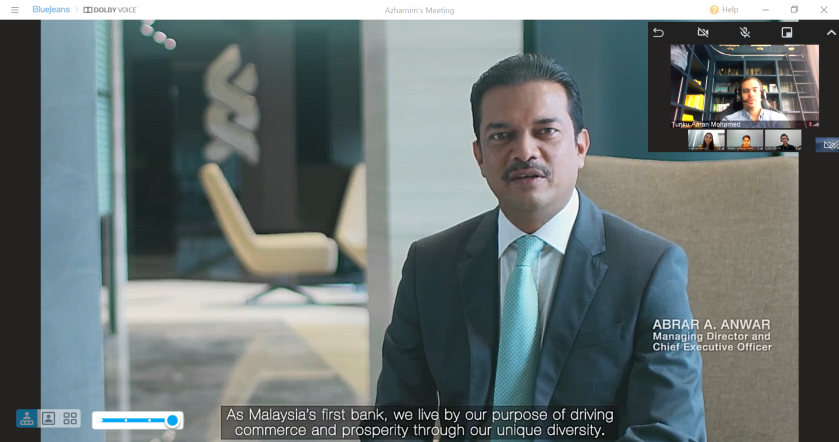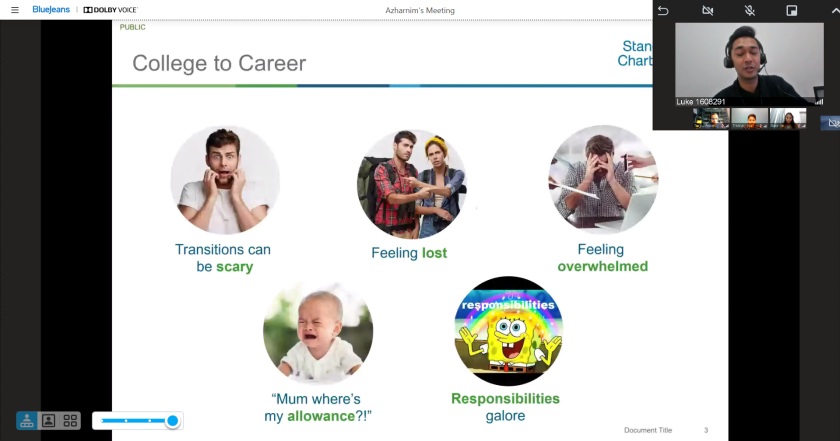With the ever-growing uncertainties surrounding the current pandemic situation, most people will consider getting a job in these times a blessing. However, getting the job is just the first step in the long journey of adulthood. Most graduates not only want to get a job but also want to thrive and be acknowledged in the workplace. Hence, Sunway Career Services collaborated with Standard Chartered Bank Malaysia to organise an e-career talk on the topic of ‘Tips to Help Graduates Succeed in Their First Job’ on 20 October 2020 via BlueJeans.
Tunku Aaran who is the resourcing relationship manager of Malaysia and Asia began the talk by introducing the objective of the talk which is to help the audience cope with the study-to-work life transition, to share insights on the work-life and to share Standard Chartered Bank’s values. After that, Tunku Aaran went ahead to introduce one of the speakers of the day – Luke Ratnasingam.
After taking over the screen, Luke shared about how he used to be an engineering student but is now working in Standard Chartered Bank Malaysia as a Client Manager. Whereas Nur Sabrina Hanul who is the second speaker of the day was a psychology student and is now a credit analyst in the same bank. “How do you feel about transitioning to working life from university life” was the first question Luke raised. Luke shared that most people would be scared of the unknown and this transition can be a very big deal for young students. Besides the fear of uncertainty, a lot of working adults are also concerned about the lack of cash and the added responsibility of needing to report to bosses. Despite all these concerns, Luke reminded the audience not to be sad about it and highlights how it’s actually a good thing because at least now people are aware of their feelings and can take the necessary steps to succeed in the workplace. With that, Luke started sharing tips to help graduates succeed in their first job.
Tip 1: Determine your goal
How does one determine one’s goal? Luke suggested to begin by asking oneself these key questions: ‘What am I good at?’, ‘What do people think I’m good at?’ and ‘What is holding you back?’. Luke explained that what one loves and what one is good at may not always be the same. Therefore, it’s always best to take tests or ask the people around to get to know oneself better. Besides, the importance of figuring out what is holding one back is so that one will be able to determine one’s weaknesses and come up with an action plan to tackle it. After asking those questions, one should spend more time trying to figure out what one is good at by trying new things.
Tip 2: Be Proactive
Being proactive is to consciously make the decision to go out of one’s way and take action. How does one be a proactive person in the workplace? The first thing to do is to take more initiatives. A simple example of taking initiatives is to go up to one’s boss and say ‘I would like to help you with these slides?/ Can I help you get these documents?’. It is basically small steps one can take to assist or add value to the team. The next thing to do is to be heard. One cannot expect other people to read one’s mind, if one wants something, one has to ask for it. For example, if one needs to give an input to the boss, one would need to speak out in order for the boss to understand. Taking initiative may be more challenging for introverted people. If one feels shy, one can start by greeting a random stranger or smiling. This will build self-confidence and one will eventually find themselves being more outspoken. Being proactive can start with small things like picking up things for the boss and this will help one stand out from the people around because going out of one’s way to add value to the team is always appreciated in the workplace.
Moving on, the next few tips were shared by Sabrina.
Tip 3: Building your network
“Your network is essentially your net worth”, this means one should start investing in relationships because this is how value can be brought to oneself and to one’s work tasks. Networking is one of the most important business skills that one absolutely needs no matter what one’s job is. Relationships are more important than a resume because action speaks louder than words. To succeed in one’s first job, one has to stand out, one needs to prove oneself and perform in the workplace. One of the ways to stand out is to build mutual trust by building relationships with colleagues. Attending networking events can give opportunities to meet potential employers, clients, business partners and more. One can also connect with these people on LinkedIn which was highly recommended by Sabrina as a way to advance one’s relationship and opportunities. One must make sure that one is memorable during networking events by telling the other person how one is able to bring value to the person. After networking, one must actively stay in touch by connecting on LinkedIn and taking the initiative to do things like commenting on other people’s posts. Lastly, volunteering is a great way to network because the setting is more relaxed and one is able to have more meaningful conversations while giving back to the community.
Tip 4: Continue learning
Learning is a continuous commitment. A lot of roles in different industries will require one to take tests or exams. It is important to expand one’s interest because it keeps one’s mind fresh. One can also get certified after completing an online course and show it off on the resume or LinkedIn. Doing so also establishes one as a continuous learner, which is what employers globally are looking for. Thirdly, being up to date with global trends, new discoveries because this is important for self-growth and helps one to cater to clients better. Continuously asking for feedback is also important because this helps one to improve the quality of work. Once one has practical and theoretical knowledge, one must consider how to combine them both and develop critical thinking.
Tip 5: It’s okay to make mistakes
When working, one will be doing a lot of things at one go, so one has to juggle with daily work tasks and responsibilities outside of work, hence, mistakes are bound to happen. One shouldn’t dwell too much on past mistakes, instead, take responsibility and focus on what can be done to fix it and learn to not do it again.
Motivational Crumbs
After that, Luke shared some “motivational crumbs” with the audience in the hope of inspiring the audience during the school-to-work transition. Firstly, he explained that jobs can make a huge impact on an individual’s life as recent research showed that a working adult spends on average ⅓ of their lifetime working. Therefore, it is important to make the most out of it. He also further explained this can be achieved by prioritizing the responsibilities and allocating certain time for it. This can help to avoid negative feelings such as burnout, which is common in working adults. He also highlighted that “Instead of trying to strike for a work-life balance, try to strike for a good life by making your work your passion.” Secondly, he highlighted the importance of believing in one’s self. Luke pointed out that many people often give up because they tend to think they are not good enough. Hence, Luke emphasized that perseverance is the key to success, especially for fresh graduates who are working on their first job. Lastly, he reminded the audience to not get beaten up when faced with obstacles at work because every expert was once a beginner.
Standard Chartered Bank’s Core Values
After that, Sabrina took over the webinar to share Standard Chartered Bank’s core values, which are:
- Do the right thing
- Never settle
- Better together
She explained that all the tips shared above were all related to the company’s core values. For example, the second core value, “Never settle” is related to tip number 4 -continue learning. This is because Standard Chartered Bank strongly believes that everyone should never stop learning as the world is ever-changing. As the first bank in Malaysia which is still currently growing at a steady pace, Standard Chartered Bank has proved that the 3 core values are the key to success in the long term. Therefore, Standard Chartered Bank believes that with these 3 core values in mind, people can succeed in their own field too.
After that, a video about Standard Chartered Bank was shared by Tunku. In the video, the missions and beliefs of Standard Chartered Bank were explained. As one of the most well-established banks in the world, Standard Chartered Bank has led the way by taking corporate social responsibility earnestly in order to create a positive impact on the world.

Q&A Session
For the last part of the webinar, Luke and Sabrina welcomed the audience to ask any questions. Firstly, a student asked their opinions on one of the tips mentioned earlier regarding proactivity. The student asked if it is ideal to continue to remain proactive when their action is not welcomed. Luke answered that it is definitely important to have the initiative to be proactive no matter what the circumstance is. Secondly, another participant asked if they have any tips and tricks on coping with stress from work. Sabrina replied that it is important to first figure out what he or she would like to do when feeling stressed out. She gave an example that this can be taking time alone or spending quality time with friends and family. From there, take a step back and remember that the stress now is only temporary. Tunku also further highlighted that Standard Chartered Bank had also paid great attention to their employees’ mental health, especially during the current COVID-19 pandemic. Therefore, Standard Chartered Bank always advised their employees to take a break to take care of their mental health. Then, another participant also seeked Luke and Sabrina’s advice on dealing with the generation gap issue between young and elder employees. Sabrina advised that by taking the initiative to start conversation is a good way to break the barriers between generations.
Before the webinar came to an end, the hosts invited everyone to turn on their webcams for a virtual group photo session. They also thanked everyone for their participation and fruitful discussion. They hope that the webinar provided the audience an insight on how to succeed in their first job.
Written by: Joan and Pei Zoe
Edited by: Maki





